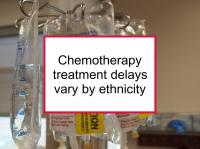A new study has reported that African American and Latina women are more likely to experience potentially harmful treatment delays in starting chemotherapy after surgery for breast cancer. Previous studies have reported poorer survival among women starting chemotherapy more than 90 days after surgery.
The present study included 107,587 women selected from the National Cancer Database who were diagnosed with invasive breast cancer (stages I to III) between 2004 and 2006. All of the women included in the study were treated with surgery and chemotherapy. The authors evaluated various factors associated with prolonged time between surgery and the start of chemotherapy. The average time between surgery and the first round of chemotherapy was 41 days. Overall, 85.2% of the women started receiving chemotherapy within 60 days of surgery and 95.8% had begun chemotherapy within 90 days.
African American women were found to have a 36% higher risk of a delay of at least 60 days and a 56% higher risk of a delay of at least 90 days than non-Hispanic white women. Similarly, Latinas had a 31% higher risk of a delay of at least 60 days and a 41% higher risk of a delay of 90 days or more compared with white women. Insurance type, cancer stage, the presence of one or more disorders in addition to breast cancer, and treatment facility type were also found to be associated with delays in receiving chemotherapy. The authors conclude that the majority of the women studied received chemotherapy within the time frame for which there is no evidence of poorer outcome, namely 90 days. However, delays varied by patient factors and by clinical and facility factors. More studies are needed regarding the role of structural, physician, clinical, and patient factors in populations of women with higher rates of chemotherapy delay.
African American and Latina breast cancer patients fare worse
There are multiple reasons for the fact that African American and lower income Latina women fare worse than white women once diagnosed with breast cancer (even though their rates of breast cancer are lower than the overall U.S. population). This study adds to the body of work indicating that disparities in cancer treatment may account for part of the differences in survival. What are we to do with this information?
Unfortunately, appropriate and timely treatment doesn't necessarily happen automatically for breast cancer patients despite the high stakes involved with such a potentially serious diagnosis. This is also the case for white patients, but it is apparent that more of them quickly become adept at negotiating the health care systems in which they receive their treatment (an ability which derives in part from practice in other majority-dominated social systems). It is important for African American and Latina breast cancer patients (and family members most concerned with their well being) to become educated regarding treatment options and to push for timely and appropriate care. This includes asking each cancer care provider for their recommendations for follow-on care and setting up appointments with new specialists as quickly as possible. In particular, the hand-over from breast cancer surgeon to oncologist should happen quickly instead of dragging on for weeks.
Breast cancer health care providers are likely to be aware of the fact that African American women are more likely to be diagnosed with more aggressive breast cancer types than white (or Latina) women and may assume that this accounts for the disparity in survival. However, as the study described above shows, this is not the whole story. In a health care center that has capacity constraints (as many do), timely and appropriate breast cancer treatment may depend, in part, on the efforts of the patients themselves to arrange such care. Health care providers who fail to ensure that every patient has the opportunity to obtain the best available treatment in a timely manner may be acting unintentionally, but the outcome will still be harmful for some women.
Overworked oncologists and other cancer specialists who are accustomed to the aggressive approach adopted by many upper middle class women may not recognize the need to take the time to educate and support other women (including those who do not speak English). Unfortunately, these are some of the very women who most rely on their doctors to take care of them when faced with a life threatening disease. Breast cancer treatment centers need to do a better job of coordinating care for breast cancer patients.
